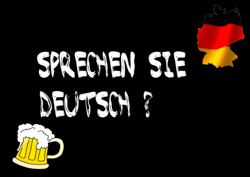You hardly find it in a German course book, but it is very useful in everyday life and you can use it to impress you German friends and colleagues: it’s German slang (Umgangssprache).
Let’s learn a bit of German street language.
Auf jeden Fall or Auf jeden
Absolutely yes, for sure. If this is your answer use “auf jeden Fall”, if you are a cool person just say “auf jeden”.
Want to say a strong no, say auf keinen Fall.
“Sehen wir uns morgen?”
“Auf Jeden”
Na? Wie geht’s or Na? was geht ab?
It’s more a gangsta language, or wannabe gangsta, I would translate in And? what’s up?
Don’t use it in an interview, or at your first meeting with your parents-in-law.
“Na? Was geht, Alter?”
Nö / Nee / Nää
You barely heard anyone saying “nein”, much more used the street version with many variants: Nö, Nee, Nää.
If you happen to search nö it in the Duden dictionary you find the meaning of “short name for Niederösterreich”: “Nööööööööö!!!”
Kippe
“Hast du eine Kippe?”
Usually asked from some youngster while you are walking with your favourite music in ears. You might know the verb kippen (=to tilt), well kippe has nothing to do with it. Eine Kippe is simply the slang word for cigarette (die Zigarette in plain German).
Schicki micki or schikimicki
This strange word means posh but also snob. It depends on the context where do you use it if you want to give the negative meaning or not.
For info Munich is said to be the capital of schickimicki.
“Ich hasse diese schikimicki Schlampe!”
Krass
It is used to indicate something either extremely good or extremely bad, the common denominator is that it must be extreme.
“Er hatte einen krassen Autounfall nach dem Konzert”
“Das war’n krasses Konzert!”
“Jo, Man”
Na ja….
“Na ja, nicht wirklich” means “Well, not really”.
That was like “let me think”, tut there are different tone of na ja, it can be a resigned one:
“Wie geht’s?”, “Na ja, es geht so”
(“How are you doing?”, “Well, it’s going”)
Bock
You probably have heard many time the phrase “Ich habe kein Bock”, you search Bock in the dictionary you find “male goat”. Not having a goat it’s normal even if you live in the most rural country side of Germany. So why people (young especially) keep saying they have no goat?
Because in young street language Bock haben means inclination to do something.
“ich habe kein Bock”
(“I can’t be bothered”)
Geil
Literally the adjective geil means horny. But in the German slang geil stays for terrific, hot, awesome, cool. Usually you get the intended meaning from the contest where the word is used.
Giving an example only for the second meaning:
“Dieses T-Shirt ist total geil!”
You might know, for sure you don’t, but there is a rap song called “leider geil” (unfortunaly great) which could be a good exercise to hear, it talks about negative things that have also a funny aspect.
About the Author
Giulia Pulizzotto was born 28 Juni 1983 in Munich, is a teacher of German and Italian in Munich. She has a great passion for languages, traveling, discovering new cultures.
She is a polyglot speaking German, Italian, Polish, English and French… pondering a new challenge.

